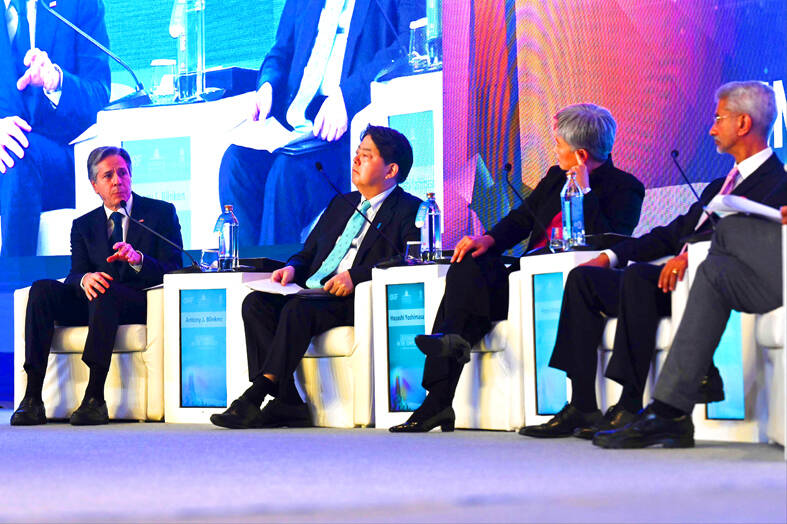The US, Japan, India and Australia yesterday expressed concern over the militarization of the East and South China seas on the heels of a flare-up in tensions between Washington and Beijing.
US Secretary of State Antony Blinken and the foreign ministers of the other three nations met in New Delhi under the auspices of a grouping they call the Quadrilateral Security Dialogue, commonly called “the Quad.”
The latest meeting, on the sidelines of a G20 gathering in the Indian capital, comes weeks after Blinken canceled a trip to Beijing following an alleged Chinese spy balloon’s flight over the US.

Photo: AFP
In a joint statement, the Quad called for “the importance of adherence to international law” in the seas “to meet challenges to the maritime rules-based order.”
“We strongly oppose any unilateral actions that seek to change the status quo or increase tensions in the area,” it said.
“We express serious concern at the militarization of disputed features, the dangerous use of coast guard vessels and maritime militia and efforts to disrupt other countries’ offshore resource exploitation activities,” the statement said.
China claims sovereignty over almost the entire South China Sea, through which massive amounts of trade passes annually.
It has ignored an international court ruling that its claims have no legal basis and built bases in the waters, alarming Washington and other Asian countries with territorial claims in the waters, including Taiwan.
Beijing has repeatedly accused the US of spearheading the Quad to encircle the rising Asian power.
However, China has no reason to fear the Quad, Japanese Minister of Foreign Affairs Yoshimasa Hayashi said.
“This is not military, but just practical cooperation,” Hayashi said at the Raisina Dialogue forum in New Delhi.
“As long as even China abides by the laws and international norms, and also acts under the international institutions, standards and laws, then this is not a conflicting issue between China and the Quad,” he said.
The ministers said they discussed joint efforts including building the resilience of supply chains and working together on vaccine delivery.
Meanwhile, the Quad allies yesterday released another statement saying that Russia cannot be allowed to wage war with impunity.
A day earlier in New Delhi, Blinken met Russian Minister of Foreign Affairs Sergei Lavrov for the first time since the Russian invasion began.
During the brief encounter, Blinken urged Moscow to end the war and reverse its suspension of the New START nuclear treaty, a senior US official said.
Moscow said that Lavrov and Blinken spoke for less than 10 minutes and did not engage in any negotiations, Russian news agencies reported.

CHAOS: Iranians took to the streets playing celebratory music after reports of Khamenei’s death on Saturday, while mourners also gathered in Tehran yesterday Iranian Supreme Leader Ayatollah Ali Khamenei was killed in a major attack on Iran launched by Israel and the US, throwing the future of the Islamic republic into doubt and raising the risk of regional instability. Iranian state television and the state-run IRNA news agency announced the 86-year-old’s death early yesterday. US President Donald Trump said it gave Iranians their “greatest chance” to “take back” their country. The announcements came after a joint US and Israeli aerial bombardment that targeted Iranian military and governmental sites. Trump said the “heavy and pinpoint bombing” would continue through the week or as long

TRUST: The KMT said it respected the US’ timing and considerations, and hoped it would continue to honor its commitments to helping Taiwan bolster its defenses and deterrence US President Donald Trump is delaying a multibillion-dollar arms sale to Taiwan to ensure his visit to Beijing is successful, a New York Times report said. The weapons sales package has stalled in the US Department of State, the report said, citing US officials it did not identify. The White House has told agencies not to push forward ahead of Trump’s meeting with Chinese President Xi Jinping (習近平), it said. The two last month held a phone call to discuss trade and geopolitical flashpoints ahead of the summit. Xi raised the Taiwan issue and urged the US to handle arms sales to

BIG SPENDERS: Foreign investors bought the most Taiwan equities since 2005, signaling confidence that an AI boom would continue to benefit chipmakers Taiwan Semiconductor Manufacturing Co’s (TSMC, 台積電) market capitalization swelled to US$2 trillion for the first time following a 4.25 percent rally in its American depositary receipts (ADR) overnight, putting the world’s biggest contract chipmaker sixth on the list of the world’s biggest companies by market capitalization, just behind Amazon.com Inc. The site CompaniesMarketcap.com ranked TSMC ahead of Saudi Aramco and Meta Platforms Inc. The Taiwanese company’s ADRs on Tuesday surged to US$385.75 on the New York Stock Exchange, as strong demand for artificial intelligence (AI) applications led to chip supply constraints and boost revenue growth to record-breaking levels. Each TSMC ADR represents

State-run CPC Corp, Taiwan (CPC, 台灣中油) yesterday said that it had confirmed on Saturday night with its liquefied natural gas (LNG) and crude oil suppliers that shipments are proceeding as scheduled and that domestic supplies remain unaffected. The CPC yesterday announced the gasoline and diesel prices will rise by NT$0.2 and NT$0.4 per liter, respectively, starting Monday, citing Middle East tensions and blizzards in the eastern United States. CPC also iterated it has been reducing the proportion of crude oil imports from the Middle East and diversifying its supply sources in the past few years in response to geopolitical risks, expanding